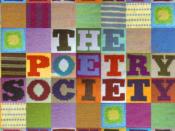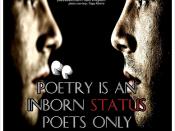Hersh Patel
AP English
14 September 2003
Commentary on Stanley Fish Article
"How to Recognize a Poem When You See One"
Stanley Fish, in his inductive essay "How to Recognize a Poem When You See One", argues that the process of "distinguishing" certain "features" of an object follows "the act of recognition". Fish offers such conclusions from a short anecdote, which illustrates an analytical response of a group of students to five names he writes on a board. The students, who focus on Christian symbols and Biblical allusions, spontaneously analyze and extract meaning from the list. The story exemplifies Fish's theory that "all objects are made not found". Fish also concludes that interpreters "find" poems, not by the poem's "distinguishing features", but by the knowledge of poems the interpreters possess; he believes that "interpreters do not decode poems; they make them". The differences an interpreter sees in certain objects result from the "different interpretive operations" he or she performs and not from "something inherent in one or another".
As Fish states, the interpreter derives this knowledge of operations from "a publicly available system of intelligibility," or, in other words, from sources of education, such as books, teachers, and "producers" of literature. The interpreter's thoughts, in essence, are the products of the quality, quantity, and focus of the source of intelligibility. In absence of this "public source", an individual's interpretation becomes prone to objectivity and subjectivity since his or her "meanings" of a text become independent of those of the "social construct".
Fish's theory that "all objects are made", "not found", through "interpretive strategies" arouses skepticism as to its validity during certain circumstances. The theory itself explains that interpreters of poetry "make" the poem, that students "make" the assignment, and that they create such objects through the "source of intelligibility",


